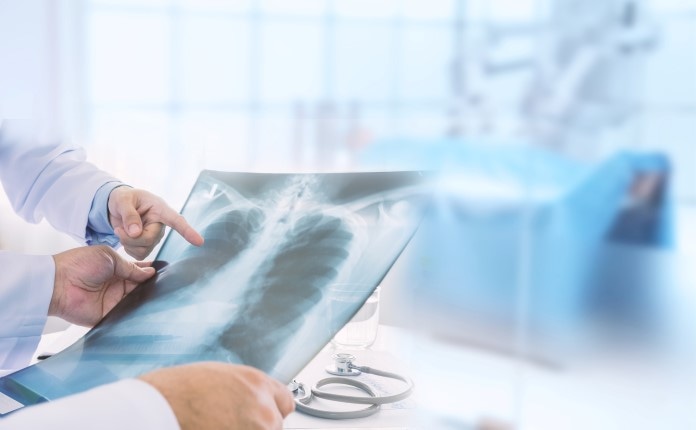What is Pneumologie?
Pneumologie is the care, treatment, and study of tuberculosis of the lung. It is therefore considered a specialization within the area of pulmonology. The term derives from the designation by Hippocrates of phthisis meaning “consumption”.
Pulmonology refers to the specialty concerned with the functioning of the respiratory system – lungs, bronchi, pleura, and trachea – as well as its diseases:
Due to the consequences of oxygen depletion on an organism, pulmonology is closely linked to:

When to consult a pulmonologist?
A persistent cough, an abnormal secretion of bronchial mucus, shortness of breath accentuated by exertion (dyspnea), chest pain, sleep disturbances, or even traces of blood in sputum require consultation of the attending physician who will assess the relevance of the treatment. ‘a reorientation towards a pulmonologist. The risk of suffering from lung disease is greater in people who smoke, who suffer from hypertension, or who are exposed to certain substances such as sawdust, asbestos, cement … When a pulmonary pathology is proven, it is no longer necessary to go through the attending physician for follow-up.
What does the pulmonologist do?
At the end of an in-depth questionnaire, on your personal (childhood illnesses) and family history in particular, the pulmonologist examines you using a stethoscope and checks the oxygen saturation – a sensor on the finger -, the pulse, the heart rate, body temperature, blood pressure. Blood gas analysis to assess oxygenation (arterial gas measurement) or respiratory functional exploration (EFR) by spirometer can be performed directly in the city office or at the hospital. Other tests such as blood, urine or sputum tests (tuberculosis), imaging(chest x-ray, chest CT scan, bronchial endoscopy), stress test, polysomnographic recording may be necessary to make the diagnosis.
How is a pneumology treatment going?
Depending on the conditions, the treatments can be administered orally or by injection but also by inhalation. Note that the effectiveness of this mode of treatment depends greatly on strict compliance with the instructions for use of the inhalation device. The inhaled route is also used to improve oxygenation (oxygen therapy) in cases of respiratory failure, in cases of sleep apnea with the continuous positive pressure ventilation mask. The pulmonologist can finally resort to respiratory rehabilitation. This outpatient program includes, among other things, respiratory physiotherapy, physical activity (exercise re-training, muscle strengthening, and endurance), nutritional rehabilitation, and psychological support.
**What is Pneumologie?**
**Introduction:**
Pneumologie, also known as pulmonology, is a branch of medicine that encompasses the study, diagnosis, and treatment of diseases and disorders of the lungs and respiratory tract.
**Scope of Pneumologie:**
Pneumologists specialize in evaluating, managing, and preventing a wide range of respiratory conditions, including:
* Asthma and chronic obstructive pulmonary disease (COPD)
* Pneumonia and other respiratory infections
* Lung cancer and other thoracic malignancies
* Sleep-related breathing disorders, such as obstructive sleep apnea
* Interstitial lung diseases (e.g., pulmonary fibrosis)
* Pulmonary embolism and other cardiovascular disorders affecting the lungs
**Diagnostic Tools and Procedures:**
Pneumologists utilize various diagnostic tools and procedures to assess respiratory health, including:
* Physical examination and history taking
* Chest X-rays and computed tomography (CT) scans
* Pulmonary function tests (e.g., spirometry)
* Endoscopy (e.g., bronchoscopy)
* Tissue biopsies
**Treatment Options:**
Depending on the underlying condition, pneumologists offer a range of treatment options tailored to the individual patient’s needs. These may include:
* Medications (e.g., bronchodilators, antibiotics, steroids)
* Oxygen therapy
* Pulmonary rehabilitation
* Nonsurgical and surgical interventions
**Importance of Pneumologie:**
Respiratory diseases are a prevalent global health concern, affecting millions of individuals. Pneumology plays a crucial role in improving patient outcomes and reducing the burden of these conditions by providing:
* Early detection and diagnosis of respiratory ailments
* Comprehensive and individualized treatment plans
* Monitoring and management of chronic respiratory diseases
* Promotion of lung health and prevention of respiratory illnesses
**Conclusion:**
Pneumologie is an essential field in medicine dedicated to the diagnosis, treatment, and management of diseases and disorders affecting the lungs and respiratory tract. By unraveling the complexities of respiratory health, pneumologists contribute to improving patient care and preventing respiratory-related morbidity and mortality.








Pneumologie is a branch of medicine that deals with the respiratory system.
Pneumologie is the study of the lungs and respiratory system.